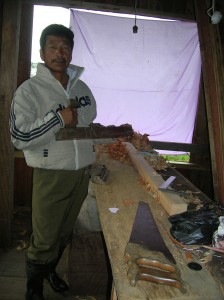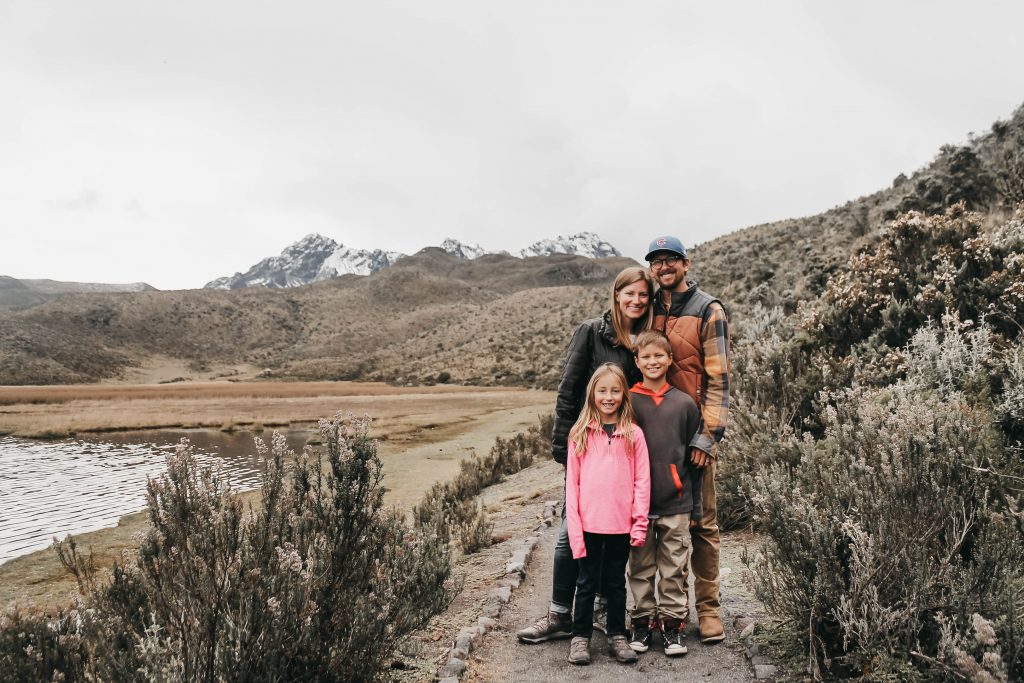By: Chris
Well it is time I (Chris) share on this blog. But if you love Jenny’s writing don’t be too disappointed. She will continue to write as well.
Over the past few months we have been traveling around sharing the story of what God is doing in Ecuador and what we as a family and our supporters have been invited to. It has been a time to visit again and again this calling, this vocation as missionaries. Furthermore, the celebration of Labor Day here in the US, where sermons, songs, and prayers about work, workers, and vocation formed our worship had me pondering. Then this morning we were off sending B to the first day of second grade, which caused me to put the thinking cap on again and churn out some thoughts on vocation.
This morning as I was pondering B’s gifts and talents the whole idea of nature vs nurture popped into my head. God has given B a curious, analytical, and critical mind, a generous and sensitive heart, a creative imagination and an amazing sense of humor. I didn’t create that or special order it, yet I have a role as a parent in developing those gifts. My vocation as a parent is simply to help cultivate B’s gifts so that he can be who he has been called to be. To cultivate gifts is to participate in the work God has called us to for the benefit of the world.
Cultivation implies a process, an ongoing exchange in which the cultivator has to work with what has been given. There are ideal conditions, tricks of the trade, and good habits that influence how well one can cultivate.
Cultivating our gifts requires us to look at the experiences, joys, and passions that each of us share. It is tempting at times to want to be able to do it all, to be the most well-rounded of people, able to be the behind-the-scenes servant and the up-front engaging leader, the person who has the practical know-how and the inspiring vision. Yet that temptation is buoyed by the fact that we cannot do it all. We haven’t been asked to. Its good that we can’t be the all-star because this draws us to community, to share our gifts with one another, so that each can join in the work.
While serving in Ecuador, Jenny and I worked alongside a small church in an extremely remote part of the country. The leader of the church, an indigenous elder named Francisco, proves to have made an indelible imprint on Jenny and I. He is a humble man, a farmer, and a survivor of a horrific landslide. He helped lead people to resettle in a safer part of the jungle, which is now named after the Covenant church there, El Pacto Sumaco.
He is illiterate. I don’t say that because I think it is important, but it is something he is acutely aware of and mentions often. He says, “I am unworthy to be your elder, illiterate as I am…,” then he proceeds to espouse some piece of amazing wisdom that rocks your world and draws you closer to God. His prayers are powerful and sincere. He communes with God through prayer in a way I do not. Yet it is through his encouragement that I came to seminary, to further cultivate my gifts.
I was wrestling with the idea of receiving a degree, another privileged educational barrier between the people I was serving alongside and myself. I was unsure of what my gifts were or how to cultivate those gifts.
After a meeting I mentioned to him our contemplating seminary. “We each have gifts and opportunities,” he said. “People say that I have a gift for intercession and wisdom, but I have the opportunity to work in my fields alone with God, and because I cannot read, my wife reads me scripture in the morning and I go off and talk to God about what I heard him say. You have the gift to read and think, that is something we need you to do. You now need to go and take the opportunity God has given you.” I was afraid of my gift. I needed, and still need Francisco and his gifts in my life in the same way he needs me and my gifts.
So, went we did. We came to Chicago, but now we didn’t know where we were going or doing. Being a pastor was never in my plans and it seemed that we could do anything. Rural pastor? Why not, I like tractors and manure. Urban pastor? Why not, I can see us serving in the city. Chaplain? Why not, I like hospitals and lab coats. We felt a bit adrift all of sudden, we had become unsettled from the plans we had, but again God shook us out of our preoccupied slumber through the words of others. During degree candidacy, Professors Soong-Chan Rah and Phil Anderson listened to my semi-bewildered predicament of not knowing my exact call. They said, “Sure we could do many things and could serve in other ways, but don’t ask ‘Could I do this?’ Ask ‘Is this where my passion lies? What will bring out the most of the gifts and experiences God has given me?’” That wasn’t always clear, but those guiding principles helped Jenny and I to look back at where we have been, what lessons were learned, and where those gifts and experiences would shape our vocation. We asked many to pray and discern with us.
Many people and places have helped us cultivate our gifts. Recently these included the opportunity to explore chaplaincy and cross-cultural pastoral care at Swedish Covenant Hospital, an internship at a congregation in the city, along with an extended family and group of friends who have selflessly encouraged us, knowing full-well the sacrifice and strain this vocation will place on our relationships with them. Cultivation takes time and we are often surprised at the results.




I think this is beautiful and deeply true. You and Fransisco encourage me to continue cultivating.
Report This Comment
Thanks, Em! Maybe someday we can take you to meet Fransisco 🙂
Report This Comment